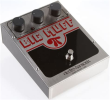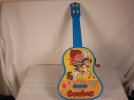I’m sure he knows what a chord is. But guitarists think very differently about them.Do you speak scales? Chords are simply words formed from the alphabet of scales.
You are using an out of date browser. It may not display this or other websites correctly.
You should upgrade or use an alternative browser.
You should upgrade or use an alternative browser.
What have I done? Crazy old woman musings
- Thread starter judypilot
- Start date
MauleSkinner
Touchdown! Greaser!
When I took piano lessons, I could play all of the major and minor scales, as well as certain chords, but identifying chords from the music on paper baffled me.Do you speak scales? Chords are simply words formed from the alphabet of scales.
My dad, on the other hand, struggled to play music as written, but could identify the chords and improvise.
I’m sure he knows what a chord is. But guitarists think very differently about them.
Okay. Being a guitar player only, I don't know how other folks think about chords.
It’s very different imo. maybe it’s just me. I played the piano as well as violin and chords there make sense to me, but when I tried the guitar it made no sense to me.Okay. Being a guitar player only, I don't know how other folks think about chords.
It’s very different imo. maybe it’s just me. I played the piano as well as violin and chords there make sense to me, but when I tried the guitar it made no sense to me.
Well, it's certainly different from piano. I don't know anything about the violin. The theory is all the same, but the actual chord forms are different. Chords are played in different voicings and inversions than they are on the piano, for a few reasons.
On a piano, any given note occurs in exactly one place, one specific piece of ebony or ivory. On a guitar, the same note can be played in multiple places. Middle C, for example, is at fret 1 on the B string, fret 5 on the G string, fret 10 on the D string, fret 15 on the A string, and fret 20 on the low E string.
Also, on a piano you can play 10 notes at a time. A guitar only has 6 strings, and within the span of a player's fingers it's almost certain that some available notes will be octaves, so the guitarist has to play chord forms which may omit certain notes and dup others.
Then there's the matter of chord position on the fretboard, which may be chosen to simplify changing to the following chord. Playing the same chord at different locations will have different voicings. There's also the method of sounding the notes, whether a top-down strum, a bottom-up strum, finger plucks, etc.
So, let's consider a simple C chord, notes C E and G. On a piano, that's what you'd play in a chosen ocatve. On a guitar, the simplest "cowboy" chord which every one learns in their first lesson is formed like this, going from low E string to high and listing the fret numbers: X 3 2 0 1 0 (X is mute, 0 is open). The notes played are, in order low to high, C E G C E. The root and the third are played twice, an octave apart, and the third is played once.
Now go from the C to a C7, notes C E G Bb and played that way on the piano. On the guitar, in first position ("cowboy" chord), we'd play X 3 2 3 1 0, notes C E Bb C E. The third has disappeared entirely! But the 7th chord is typically used in passing, resolving to an F chord, so we don't really miss having the third and there's no convenient way to play it within reach.
We could play either of these two chords in other places on the fret board, but they'd have different sounds with the notes in different orders.
I could go on with other examples, but I hope this is enough to illustrate. The different chord voicings and inversions are part of what gives a guitar its unique sound.
Guitar is a lot of fun to play, because there are many choices for how to play any given chord, not to mention picking techniques like strumming, finger picking, palm muting, hammer-on, pull-off, etc., etc. Lots of ways to be creative and expressive.
Last edited:
And no, you don't have to play full 6-string barre chords all the time to be successful as a guitarist. Most jazz players use 3- and 4-note voicings as the core of their technique, and there's no reason you cannot use that approach for just about any style of music.
This is especially true when playing in a band as opposed to solo. With other musicians, less is more. The bass player will usually hold down the root, and other instruments will be playing other parts of the chord, so you can use your ears and choose where to play and what voicings to use. Find your own niche. With our church band I'm often playing only three notes of a chord (sometimes just one or two!); more will create too much clutter.
That’s plenty enough to make me find something easier to do. LolWell, it's certainly different from piano. I don't know anything about the violin. The theory is all the same, put the actual chord forms are different. Chords are played in different voicings and inversions than they are on the piano, for a few reasons.
On a piano, any given note occurs in exactly one place, one specific piece of ebony or ivory. On a guitar, the same note can be played in multiple places. Middle C, for example, is at fret 1 on the B string, fret 5 on the G string, fret 10 on the D string, fret 15 on the A string, and fret 20 on the low E string.
Also, on a piano you can play 10 notes at a time. A guitar only has 6 strings, and within the span of a player's fingers it's almost certain that some available notes will be octaves, so the guitarist has to play chord forms which may omit certain notes and dup others.
Then there's the matter of chord position on the fretboard, which may be chosen to simplify changing to the following chord. Playing the same chord at different locations will have different voicings. There's also the method of sounding the notes, whether a top-down strum, a bottom-up strum, finger plucks, etc.
So, let's consider a simple C chord, notes C E and G. On a piano, that's what you'd play in a chosen ocatve. On a guitar, the simplest "cowboy" chord which every one learns in their first lesson is formed like this, going from low E string to high and listing the fret numbers: X 3 2 0 1 0 (X is mute, 0 is open). The notes played are, in order low to high, C E G C E. The root and the third are played twice, an octave apart, and the third is played once.
Now go from the C to a C7, notes C E G Bb and played that way on the piano. On the guitar, in first position ("cowboy" chord), we'd play X 3 2 3 1 0, notes C E Bb C E. The third has disappeared entirely! But the 7th chord is typically used in passing, resolving to an F chord, so we don't really miss having the third and there's no convenient way to play it within reach.
We could play either of these two chords in other places on the fret board, but they'd have different sounds with the notes in different orders.
I could go on with other examples, but I hope this is enough to illustrate. The different chord voicings and inversions are part of what gives a guitar its unique sound.
Guitar is a lot of fun to play, because there are many choices for how to play any given chord, not to mention picking techniques like strumming, finger picking, palm muting, hammer-on, pull-off, etc., etc. Lots of ways to be creative and expressive.
That’s plenty enough to make me find something easier to do. Lol
Like drums?

Like flyingLike drums?
Zeldman
Touchdown! Greaser!
I was learning to play the banjo until the movie ''Deliverance'' came out...
SkyChaser
Pattern Altitude
- Joined
- Mar 22, 2020
- Messages
- 2,292
- Display Name
Display name:
SkyChaser
At the risk of being pedantic, since anyone who knows a little bit about what you're talking about would find it easy to figure out...it should say the fifth disappears in many of the chords.So, let's consider a simple C chord, notes C E and G. On a piano, that's what you'd play in a chosen ocatve. On a guitar, the simplest "cowboy" chord which every one learns in their first lesson is formed like this, going from low E string to high and listing the fret numbers: X 3 2 0 1 0 (X is mute, 0 is open). The notes played are, in order low to high, C E G C E. The root and the third are played twice, an octave apart, and thethirdfifth is played once.
Now go from the C to a C7, notes C E G Bb and played that way on the piano. On the guitar, in first position ("cowboy" chord), we'd play X 3 2 3 1 0, notes C E Bb C E. Thethirdfifth has disappeared entirely! But the 7th chord is typically used in passing, resolving to an F chord, so we don't really miss having thethirdfifth and there's no convenient way to play it within reach.
MauleSkinner
Touchdown! Greaser!
My dad used to think he played better after making a fifth disappear, too.At the risk of being pedantic, since anyone who knows a little bit about what you're talking about would find it easy to figure out...it should say the fifth disappears in many of the chords.
I'm kind of a hack piano player having started on guitar and transitioned to accordion and a brief diversion on trumpet. I still tend to fake the piano left hand based on the chords because of the first two instruments.
Daleandee
Final Approach
- Joined
- Mar 4, 2020
- Messages
- 6,878
- Display Name
Display name:
Dale Andee
I play Christian piano ... my left hand don't know what my right hand is doing. But I also play jailhouse guitar ... behind a few bars and looking for a key.
But when I get get lost I do what all wanna be musicians do ... "go ahead and I'll meet you on the one"
But when I get get lost I do what all wanna be musicians do ... "go ahead and I'll meet you on the one"

2-Bit Speed
Pattern Altitude
- Joined
- Nov 9, 2021
- Messages
- 1,553
- Display Name
Display name:
2-Bit Speed
I'm kind of a hack piano player having started on guitar and transitioned to accordion and a brief diversion on trumpet. I still tend to fake the piano left hand based on the chords because of the first two instruments.
Just add Bagpipes to that list to complete your Sith training. lol

Last edited:
I too have always been envious of folks that could play a "sing along" type instrument.
I learned trumpet as a kid... that ain't one of them!
started to teach myself fiddle years ago, but every time I pulled it out my wife would ask "do you have to play that now?" Yeah I know it wasn't great but I was carrying a tune and having fun.... but that didn't matter. She always found something that needed doing right then.
Anyway, something of more help to you
I'm reminded of an interview segment I saw not long ago...searched and found it. Play ANY song with four chords
I learned trumpet as a kid... that ain't one of them!
started to teach myself fiddle years ago, but every time I pulled it out my wife would ask "do you have to play that now?" Yeah I know it wasn't great but I was carrying a tune and having fun.... but that didn't matter. She always found something that needed doing right then.
Anyway, something of more help to you
I'm reminded of an interview segment I saw not long ago...searched and found it. Play ANY song with four chords
MauleSkinner
Touchdown! Greaser!
I’ve got a coworker whose son plays bagpipes. He says having a kid learn to play bagpipes is about like having a thousand kids learning to play violin.Just Bagpipes to that list to complete your Sith training. lol
@Salty is correct. Orchestral string players think very differently than chord progressions. I was originally a music major. Took lots of music theory. I used to be able to tell you all sorts of theory on how you can progress chords through music (no parallel fifths!!!!) and I knew the difference between German, Italian and French augmented sixths. I havent had to care about that in nearly 30 years.Okay. Being a guitar player only, I don't know how other folks think about chords.
My jazz piano roommate lived in chord land. I lived in melody land. It is a different world.
I have entire technical playing books made of scales. Those were the days...
At the risk of being pedantic, since anyone who knows a little bit about what you're talking about would find it easy to figure out...it should say the fifth disappears in many of the chords.
Yes, THANK YOU. You're correct. The third is still there, keeping the chord major. It's the 5th, G, that goes away in a first postion C7.
I also messed up a bit above. The 1st and 3rd (C and E) appear twice, an octave apart, and the 5th is only there once.
(Glad to have a music major in the family to keep me straight!)
Last edited:
I play Christian piano ... my left hand don't know what my right hand is doing. But I also play jailhouse guitar ... behind a few bars and looking for a key.
But when I get get lost I do what all wanna be musicians do ... "go ahead and I'll meet you on the one"
Nice thing about playing electric - whenever I get lost I just turn off the pickups and wail. Everybody turns and looks at the sound guy.
Daleandee
Final Approach
- Joined
- Mar 4, 2020
- Messages
- 6,878
- Display Name
Display name:
Dale Andee
Nice thing about playing electric - whenever I get lost I just turn off the pickups and wail. Everybody turns and looks at the sound guy.
Everybody likes to blame the sound guy. Many moons ago I was asked to run sound for a band while thier soundman was having some surgery.
Lead guitar guys were tough to deal with as they would crank so loud from the stage that the house mix would need to come up to make them blend properly. Asking them to turn it down so the level could be controlled at the main mixer was like a FO telling the captain he was doing it wrong ...
- Joined
- May 11, 2010
- Messages
- 20,703
- Location
- Charlotte, NC
- Display Name
Display name:
Snorting his way across the USA
I appl
Yes it does make it harder. I have played violin since age five, and played in a youth symphony for two seasons around age 13. I tried to learn guitar (pops plays Flamenco style guitar) and just couldn't grasp the chord thing. My brain thinks linear scales.probably make it harder not easier. For me guitar makes no sense at all.
RussR
En-Route
@judypilot I think it's great you're learning something new! Regarding barre chords, etc., I echo the previous sentiments of "if you can't get it, find another way to play the chord". Barre chords are great but sometimes it's easier to use another form of the chord, or one with fewer strings played, etc. I don't play much "chord" music beyond dyads (two-note chords), preferring to play melodies, but even then I often have to adjust what is written on the music and what I can play. Reason is, for a tall guy (6'2") I have disproportionately short pinkies! It makes my index finger - pinkie span shorter than apparently any other guitarist, certainly shorter than the ones who write the music. Some of the music I want to play requires these big reaches that I just can't do. So I find the same note somewhere else and see if I can work it in. That, of course, as @Half Fast states, is one of the great things about guitar, any given note appears up to 6 times on the fretboard, more if you count octaves.
JOhnH
Touchdown! Greaser!
My wife played piano and cello for many years.
I dabbled at the guitar for a few years.
After we got married she asked if I would teach her how to play the guitar. (I figured that would be like trying to teach physics to Einstein ).
After another two weeks she was better than I ever was. But she got bored with it because guitar music wasn't her favorite.
To this day I pretend I like piano and cello music. It makes life much easier and more enjoyable.
I dabbled at the guitar for a few years.
After we got married she asked if I would teach her how to play the guitar. (I figured that would be like trying to teach physics to Einstein ).
After another two weeks she was better than I ever was. But she got bored with it because guitar music wasn't her favorite.
To this day I pretend I like piano and cello music. It makes life much easier and more enjoyable.
- Joined
- Mar 10, 2013
- Messages
- 19,562
- Location
- Oakland, CA
- Display Name
Display name:
Bro do you even lift
…..just play Cadd9 instead of C….
guitar AND math?!?! fuhgedaboudit.
Zeldman
Touchdown! Greaser!
- Joined
- Mar 10, 2013
- Messages
- 19,562
- Location
- Oakland, CA
- Display Name
Display name:
Bro do you even lift
judypilot
Cleared for Takeoff
Clearly I understand that being a professional guitarist is definitely not in the works, although it would be awesome to be able to go on America's Got Talent and play something like "Born to be Wild" while wearing my motorcycle leathers. However, as I bought an acoustic guitar, it wouldn't have the same effect. Maybe I should consider buying an electric guitar, too.There are other things to consider…WHY are you doing this? If the sole purpose was to be a professional guitarist, and that would take 20 years, I’d say forget it.
But it sounds like it’s more about an activity that gives you enjoyment, so as long as it’s doing that, keep enjoying it. When you aren’t strong enough to do chords, pick up a slide
Daleandee
Final Approach
- Joined
- Mar 4, 2020
- Messages
- 6,878
- Display Name
Display name:
Dale Andee
it would be awesome to be able to go on America's Got Talent and play something like "Born to be Wild" while wearing my motorcycle leathers. However, as I bought an acoustic guitar, it wouldn't have the same effect.
Just plug the acoustic into one of these! @Half Fast can assist you with the particuliars ...


Clearly I understand that being a professional guitarist is definitely not in the works, although it would be awesome to be able to go on America's Got Talent and play something like "Born to be Wild" while wearing my motorcycle leathers. However, as I bought an acoustic guitar, it wouldn't have the same effect. Maybe I should consider buying an electric guitar, too.
You could play “Crazy On You” with the acoustic. Of course, you’ll have to do the Nancy Wilson high kick.
But yes, you should get an electric. I love my Les Pauls, but if you’ll only have one make it a Fender Stratocaster.
Ted
The pilot formerly known as Twin Engine Ted
- Joined
- Oct 9, 2007
- Messages
- 30,006
- Display Name
Display name:
iFlyNothing
@judypilot kudos for deciding to do this. It's important to keep learning and keep the brain and body active.
Setting goals for yourself is good, but so is keeping them realistic and reasonable. Be kind with yourself for not sounding like a rock star - remember it's considered to take 10,000 hours to become a "master" at a skill. Most of us for most skills don't get there, but that doesn't mean we can't have fun and still be good.
Setting goals for yourself is good, but so is keeping them realistic and reasonable. Be kind with yourself for not sounding like a rock star - remember it's considered to take 10,000 hours to become a "master" at a skill. Most of us for most skills don't get there, but that doesn't mean we can't have fun and still be good.
judypilot
Cleared for Takeoff
I could pull off the high kick (actually, I have no idea what you're talking about, so I'm imagining a leg kick higher than my head). Of course, I might fall over backwards, but it would be spectacular at first.You could play “Crazy On You” with the acoustic. Of course, you’ll have to do the Nancy Wilson high kick.
But yes, you should get an electric. I love my Les Pauls, but if you’ll only have one make it a Fender Stratocaster.
My first husband was one of those people who could pick up any stringed instrument and make it sound good after (seemingly) a few minutes. I think he had a Fender, although I don't know if it was a Stratocaster. (I should ask him--we do still communicate once in awhile.)
Naw, I'm aiming for "Born to be Wild" in my leathers.
judypilot
Cleared for Takeoff
Only 9,923.5 hours to go! At the rate I'm going, I'll become a master guitarist about the same time I die. (I'm actually keeping a practice log, so this is actually pretty accurate.) Seriously, if I can play at church or for a few friends and not sound like a complete idiot, I'll be happy.@judypilot kudos for deciding to do this. It's important to keep learning and keep the brain and body active.
Setting goals for yourself is good, but so is keeping them realistic and reasonable. Be kind with yourself for not sounding like a rock star - remember it's considered to take 10,000 hours to become a "master" at a skill. Most of us for most skills don't get there, but that doesn't mean we can't have fun and still be good.
The joy is in the journey!Only 9,923.5 hours to go! At the rate I'm going, I'll become a master guitarist about the same time I die. (I'm actually keeping a practice log, so this is actually pretty accurate.) Seriously, if I can play at church or for a few friends and not sound like a complete idiot, I'll be happy.
I picked up guitar when I was in college, but never took lessons so never took the time to get good. I can play simple chords and uncomplicated strumming patterns.
However, I started Irish tin whistle lessons a year ago (after fiddling around for a couple years) and it's been great fun. I swear it's harder than flying, but is way cheaper. I've been going to sessions at local bars and it's a hoot. I also play at church regularly, typically covering a flute part, though some songs have whistle parts.
I am also planning a session at AirVenture again this year in conjunction with the Flying Musicians Association. Drop by with your guitar, Thursday night at 7 am at the Ultralight Forums tent. Most tunes are in D or G, with various mode variations based on those keys (i.e., simple chords). For example, looking at a tune I have here in front of me, (Out on the Ocean), the chords are D, C, G and E. Another, (The Foxhunter) is D, A, G, Em.
Seriously, if I can play at church or for a few friends and not sound like a complete idiot, I'll be happy.
Just learn about a dozen chords, get a capo, and you’ll be there. Bonus points if you learn some simple fingerpicking.
I could pull off the high kick (actually, I have no idea what you're talking about, so I'm imagining a leg kick higher than my head).
She's been doing this for about 50 years now.



Naw, I'm aiming for "Born to be Wild" in my leathers.
Maybe I should put on Dockers and a button-down and play "Born To Be Mild"......
Ted
The pilot formerly known as Twin Engine Ted
- Joined
- Oct 9, 2007
- Messages
- 30,006
- Display Name
Display name:
iFlyNothing
Only 9,923.5 hours to go! At the rate I'm going, I'll become a master guitarist about the same time I die. (I'm actually keeping a practice log, so this is actually pretty accurate.) Seriously, if I can play at church or for a few friends and not sound like a complete idiot, I'll be happy.
I figure the 10,000 hour mark is something you can look at a couple of ways.
1) "I'll never get there, it's so far"
2) ""I may not get there, so I don't have to beat myself up about not being as good as [expert who's spent 10k+ hours]"
I like option 2 better. Your goal is a great one.
I figure the 10,000 hour mark is something you can look at a couple of ways.
1) "I'll never get there, it's so far"
2) ""I may not get there, so I don't have to beat myself up about not being as good as [expert who's spent 10k+ hours]"
I like option 2 better. Your goal is a great one.
Nah, 10k hours isn't necessary. For rock & roll all you need is a handful of chords, a loud amplifier (it should go to 11), a lot of distortion, and an attitude.
Like the song says,....
You don't have money or a fancy car
And you're tired of wishing on a falling star
You got to put your faith in a loud guitar
Ted
The pilot formerly known as Twin Engine Ted
- Joined
- Oct 9, 2007
- Messages
- 30,006
- Display Name
Display name:
iFlyNothing
Nah, 10k hours isn't necessary. For rock & roll all you need is a handful of chords, a loud amplifier (it should go to 11), a lot of distortion, and an attitude.
Like the song says,....
You don't have money or a fancy carAnd you're tired of wishing on a falling starYou got to put your faith in a loud guitar
The 10k hour theory is around becoming a master at a skill. That was referencing Judy's statement earlier in the thread about how some of the guitarists she admires probably played for 20 years (and >10k hours) to get where she knew who they were.
I agree with you - there's no need to get that much to be able to still be good enough to have fun.

